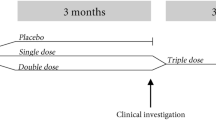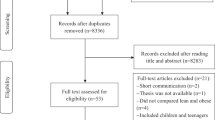Abstract
Gut microbiota is important for maintaining body weight. Modulation of gut microbiota by probiotics may result in weight loss and thus help in obesity treatment. The aim of this systematic review was to evaluate the effects of Lactobacillus on weight loss and/or fat mass in overweight adults. A search was performed on the Medline (PubMed) and Scopus electronic databases using the search terms: ‘probiotics’, ‘Lactobacillus, ‘obesity’, ‘body weight changes’, ‘weight loss’, ‘overweight’, ‘abdominal obesity’, ‘body composition’, ‘body weight’, ‘body fat’ and ‘fat mass’. In the total were found 1567 articles, but only 14 were included in this systematic review. Of these nine showed decreased body weight and/or body fat, three did not find effect and two showed weight gain. Results suggest that the beneficial effects are strain dependent. It can highlight that Lactobacillus plantarum and Lactobacillus rhamnosus when combined with a hypocaloric diet, L. plantarum with Lactobacillus curvatus, Lactobacillus gasseri, Lactobacillus amylovorus, Lactobacillus acidophilus and Lactobacillus casei with phenolic compounds, and multiple species of Lactobacillus.
This is a preview of subscription content, access via your institution
Access options
Subscribe to this journal
Receive 12 print issues and online access
$259.00 per year
only $21.58 per issue
Buy this article
- Purchase on Springer Link
- Instant access to full article PDF
Prices may be subject to local taxes which are calculated during checkout


Similar content being viewed by others
References
World Health Organization (WHO). Fact sheet: Obesity and Overweight, n. 311, 2015. Available at: http://www.who.int/mediacentre/factsheets/fs311/en/index.html (accessed 20 July 2016).
Associação Brasileira para o Estudo da Obesidade e da Síndrome Metabólica (ABESO) Diretrizes Brasileiras de Obesidade: 2009/20103.. AC Farmacêutica: São Paulo, 2009.
Angelakis E, Armougom F, Milion M, Raoult D . The relationship between gut microbiota and weight gain in humans. Future Microbiol 2012; 7: 91–109.
Amyot J, Semanche M, Ferdaoussi M, Fontés G, Poitout V . Lipopolysaccharides impair insulin gene expression in isolated islets of langerhans via toll-like receptor-4 and NF-kB signalling. PLoS One 2012; 7: e36200.
Carvalho BM, Saad MJ . Influence of gut microbiota on subclinical inflammation and insulin resistance. Mediators Inflamm 2013; 2013: 986734.
Parekh PJ, Arusi E, Vinik AI, Johnson DA . The role and influence of gut microbiota in pathogenesis and management of obesity and metabolic syndrome. Front Endocrinol 2014; 5: 47.
Baothman AO, Zamzami MA, Taher I, Abubaker J, Abu-Farha M . The role of gut microbiota in the development of obesity and diabetes. Lipids Health Dis 2016; 15: 108.
Brasil. ANVISA. Agência Nacional de Vigilância Sanitária. Resolução RDC nº 2, de 7 de janeiro de 2002. Aprova o regulamento técnico de substâncias bioativas e probióticos isolados com alegação de propriedades funcional e/ou de saúde. Diário Oficial da União, Poder Executivo, 9 Jan 2002. Available at: http://portal.anvisa.gov.br/wps/wcm/connect/1c77370047457bcc8888dc3fbc4c6735/RDC_02_2002.pdf?MOD=AJPERES (accessed: 20 July 2016).
Da Silva ST, dos Santos CA, Bressan J . Intestinal microbiota: relevance to obesity and modulation by prebiotics and probiotics. Nutr Hosp 2013; 28: 1039–1348.
Aggaewal J, Swami G, Kumar M . Probiotics and their effects on metabolic diseases: an update. J Clin Diagn Res 2013; 7: 173–177.
Ivey KL, Hodgson JM, Kerr DA, Thompson PL, Stojceski B, Prince RL . The effect of yoghurt and its probiotics on blood pressure and serum lipid profile: a randomized controlled trial. Nutr Metab Cardiovasc Dis 2015; 25: 46–51.
Higgins JPT, Green S Cochrane Handbook for Systematic Reviews of Interventions version 5.1. 0. Updated March 2011. The Cochrane Collaboration 2011. Available at: http://www.cochranehandbook.org (accessed: 20 July 2016).
Woodard GA, Encarnacion B, Downey JR, Peraza J, Chong K, Hernandez-Boussard T et al. Probiotic improve outcomes after Roux-en-Y gastric bypass surgery: a prospective randomized trial. J Gastrointest Surg 2009; 13: 1198–1204.
Leber B, Tripolt NJ, Blattl D, Eder M, Wascher TC, Pieber TR et al. The influence of probiotic supplementation on gut permeability in patients with metabolic syndrome: an open label, randomized pilot study. Eur J Clin Nutr 2012; 66: 1110–1115.
Doria E, Buonocore D, Michelotti A, Nobile V, Marzatico F . Evaluation of a phyto-supplement efficacy as adjuvant in reducing body weight and fat mass in overweight women. Curr Top Nutraceutical Res 2013; 11: 21–28.
Jung SP, Lee KM, Kang JH, Yun SI, Park HO, Moon Y et al. Effect of Lactobacillus gasseri BNR17 on overweight and obese adults: a randomized, double-blind clinical trial. Korean J Farm Med 2013; 34: 80–89.
Kadooka Y, Sato M, Ogawa A, Miyoshi M, Uenishi H, Ogawa H et al. Effect of Lactobacillus gasseri SBT2055 in fermented milk on abdominal adiposity in adults in a randomized controlled trail. Br J Nutr 2013; 110: 1696–1703.
Omar JM, Chan YM, Jones ML, Prakash S, Jones PJH . Lactobacillus fermentum and Lactobacillus amylovorus as probiotics alter body weight adiposity and gut microflora in healthy persons. J Funct Food 2013; 5: 116–123.
Sharafedtinov KK, Plotnikova OA, Alexeeva RI, Stentsova TB, Songisepp E, Stsepetova J et al. Hypocaloric diet supplementation with probiotic cheese improves body index and blood pressure indices hypertensive patients - a randomized double-blind placebo-controlled pilot study. Nutr J 2013; 12: 138–149.
Tripolt NJ, Leber B, Blattl D, Eder M, Wonisch W, Scharnagl H et al. Short communication: effect of supplementation with Lactobacillus casei Shirota on insulin sensitivity, β-cell function, and markers of endothelial function in subjects with metabolic syndrome—a pilot study. J Dairy Sci 2013; 96: 89–95.
Jung S, Lee YJ, Kim M, Kim M, Kwak JH, Lee JW et al. Supplementation with two probiotic strains, Lactobacillus curvatus HY7601 and Lactobacillus plantarum KY1032, reduced body adiposity and Lp-PLA2 activity in overweight subjects. J Funct Foods 2015; 19: 744–752.
Chung HJ, Yu JG, Lee IA, Liu MJ, Shen YF, Sharma SP et al. Intestinal removal of free fatty acids from hosts by Lactobacilli for the treatment of obesity. FEBS Open Biol 2016; 6: 64–76.
Agerholm-Larsen L, Raben A, Haulrik N, Hasen AS, Manders M, Astrup A . Effect of 8 week intake of probiotic milk products on risk factors for cardiovascular diseases. Eur J Clin Nutr 2000; 54: 288–297.
Kadooka Y, Sato M, Imaizumi K, Ogawa A, Ikuyama K, Akai Y et al. Regulation of abdominal adipocity by probiotics (Lactobaacillus gasseri SBT2055) in adults with obese tendencies in a randomized controlled trial. Eur J Clin Nutr 2010; 64: 636–643.
Sanchez M, Darimont C, Drapeau V, Emady-Azar S, Lepage M, Rezzonico E et al. Effect of Lactobacillus rhamnosus CGMCC13724 supplementation on weight loss and maintenance in obese men and women. Br J Nutr 2014; 111: 1507–1519.
Nakamura F, Ishida Y, Aihara K, Sawada D, Ashida N, Sugawara T et al. Effect of fragmented Lactobacillus amylovorus CP1563 on lipid metabolism in overweight and mildly obese individuals: a randomized controlled trial. Microb Ecol Health Dis 2016; 27: 30312.
Aronsson L, Huang Y, Parini P, Karoch-andré M, Hakansson J, Gustafsson JA et al. Decreased fat storage by Lactobacillus paracasei is associated with increased levels of angiopoietin-like 4 protein (ANGPTL4). PLoS One 2010; 5: e13087.
Wagenknecht LE, Langefeld CD, Csherzinger AL, Norris JM, Haffner SM, Saad MF et al. Insulin sensitivity, insulin secretion, and abdominal fat: the insulin resistance atherosclerosis study (IRAS) family study. Diabetes 2003; 52: 2490–2496.
Fox CS, Massaro JM, Hoffman U, Pou KM, Maurovich-Horvat P, Liu CY et al. Abdominal visceral and subcutaneous adipose tissue compartments: association with metabolic risk factors in the Framingham Heart Study. Circulation 2007; 116: 39–48.
Kang JH, Yun SI, Park HO . Effects of Lactobacillus gasseri BNR17 on body weight and adipose tissue mass in diet-induced overweight rats. J Microbiol 2010; 48: 712–714.
Sato M, Uzu K, Yoshida T, Hamad EM, Kawakami H, Matsuyama H et al. Effects of milk fermented by Lactobacillus gasseri SBT2055 on adipocyte size in rats. Br J Nutr 2008; 99: 1013–1017.
Kawano M, Miyoshi M, Ogawa A, Sakai F, Kadooda Y . Lactobacillus gasseri SBT2055 inhibits adipose tissue inflammation and intestinal permeability in mice fed a high-fat diet. J Nutr Sci 2016; 5: e23.
Miyoshi M, Ogawa A, Higurashi S, Kadooka Y . Anti-obesity effect of Lactobacillus gasseri SBT2055 accompanied by inhibition of pro-inflammatory gene expression in the visceral adipose tissue in diet-induced obese mice. Eur J Nutr 2014; 53: 599–606.
Armougom F, Henry M, Vialettes B, Raccah D, Raoult D . Monitoring bacterial community of human gut microbiota reveals an increase in Lactobacillus in obese patients and Methanogens in anorexic patients. PLoS One 2009; 4: e7125.
Million M, Maraninchi M, Henry M, Armougom F, Richet H, Carrieri P et al. Obesity-associated gut microbiota is enriched in Lactobacillus reuteri and depleted in Bifidobacterium animalis and Methanobrevibacter smithii. Int J Obes 2012; 36: 817–825.
Million M, Angelakis E, Maraninchi M, Henry M, Giorgi R, Valero R et al. Correlation between body mass index and gut concentrations of Lactobacillus reuteri Bifidobacterium animalis Methanobrevibacter smithii and Escherichia coli. Int J Obes 2013; 37: 1460–1466.
Casas IA, Dobrogosz WJ . Validation of the probiotic concept: Lactobacillus reuteri confers broad-spectrum protection against disease in humans and animals. Microb Ecol Health Dis 2000; 12: 247–285.
Chang BJ, Park SU, Jang YS, Ko SH, Joo NM, Kim SI et al. Effect of functional yogurt NY-YP901 in improving the trait of metabolic syndrome. Eur J Clin Nutr 2011; 65: 1250–1255.
Drissi F, Merhej V, Angelakis E, El Kaoutari A, Carrière F, Raoult D . Comparative genomics analysis of Lactobacillus species associated with weight gain or weight protection. Nutr Diabetes 2014; 4: e109.
Hayashi T, Boyoko EJ, Leonetti DL, McNeely MJ, Newell-Morris L, Kahn SE et al. Visceral adiposity and the risk of impaired glucose tolerance a prospective study among Japanese Americans. Diabetes Care 2003; 26: 650–655.
Park JE, Oh SH, Cha YS . Lactobacillus plantarum LG42 isolated from gajami sik-hae decreases body and fat pad weights indiet-induced obese mice. J Appl Microbiol 2014; 116: 145–156.
Karlsson CLJ, Molin G, Fak F, Hagslätt MLJ, Jakesevic M, Hakansson A et al. Effects on weight gain and gut microbiota in rats given bacterial supplements and a high-energy-dense diet from fetal life through to 6 months of age. Br J Nutr 2011; 106: 887–895.
Oliveira MN, Sivieri K, Alegro JHA, Saad SMI . Aspectos tecnológicos de alimentos funcionais contendo probióticos. Rev Bras Cienc Farm 2002; 38: 1–21.
Author information
Authors and Affiliations
Corresponding author
Ethics declarations
Competing interests
The authors declare no conflict of interest.
Rights and permissions
About this article
Cite this article
Crovesy, L., Ostrowski, M., Ferreira, D. et al. Effect of Lactobacillus on body weight and body fat in overweight subjects: a systematic review of randomized controlled clinical trials. Int J Obes 41, 1607–1614 (2017). https://doi.org/10.1038/ijo.2017.161
Received:
Revised:
Accepted:
Published:
Issue Date:
DOI: https://doi.org/10.1038/ijo.2017.161
This article is cited by
-
Investigation of the probiotic supplement’s effect on obese adults demonstrated a reduction in fasting insulin levels: a double-blind randomized clinical trial
Journal of Diabetes & Metabolic Disorders (2024)
-
Therapeutic applications of melatonin in disorders related to the gastrointestinal tract and control of appetite
Naunyn-Schmiedeberg's Archives of Pharmacology (2024)
-
Unlocking the Potential of Probiotics: A Comprehensive Review on Research, Production, and Regulation of Probiotics
Probiotics and Antimicrobial Proteins (2024)
-
Exploring the mechanism of Taohong Siwu Decoction on the treatment of blood deficiency and blood stasis syndrome by gut microbiota combined with metabolomics
Chinese Medicine (2023)
-
Hypoabsorptive surgeries cause limb-dependent changes in the gut endocannabinoidome and microbiome in association with beneficial metabolic effects
International Journal of Obesity (2023)



